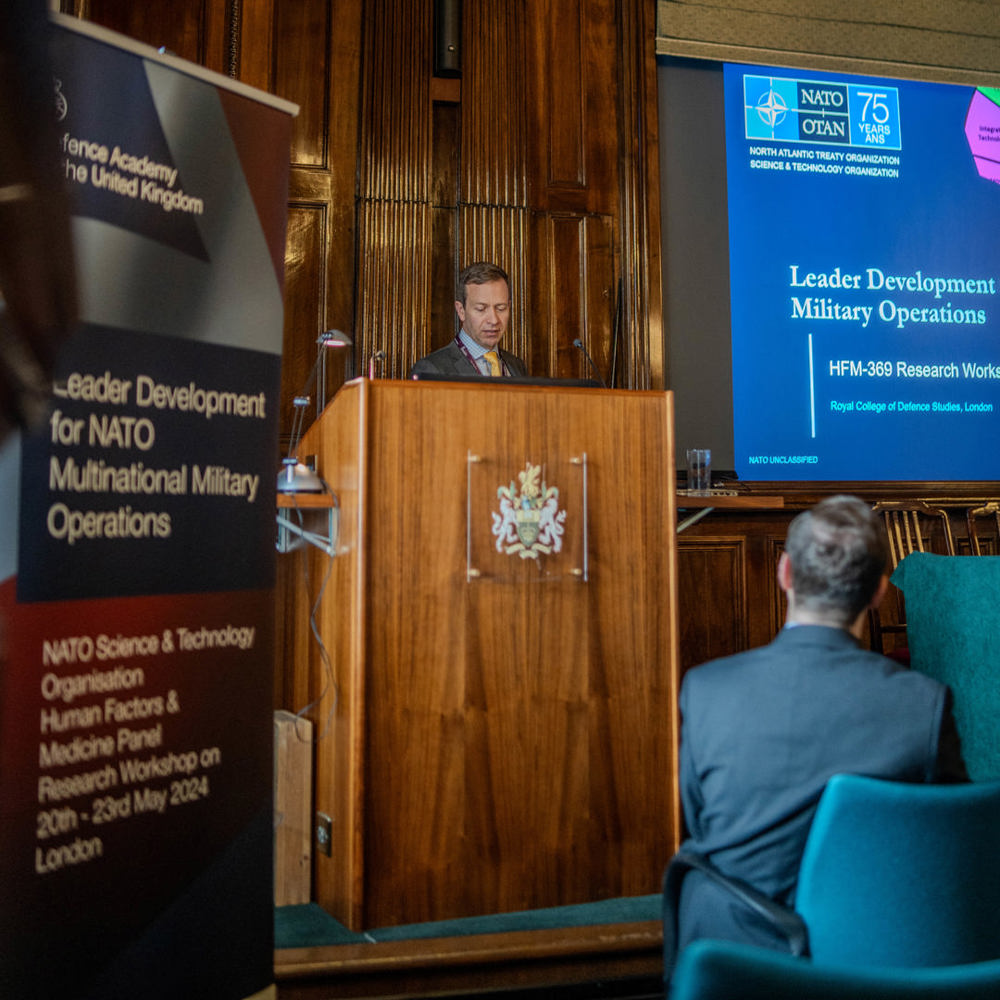A ‘first of its kind’ NATO research workshop has been delivered by the Defence Academy’s Defence Leadership Centre (DLC) at the Royal College of Defence Studies (RCDS) in London.
'Leadership Development for NATO Multinational Military Operations’ ran from 21-23 May and was opened by NATO Deputy Supreme Allied Commander Europe (DSACEUR), Admiral Sir Keith Blount KCB, OBE. The workshop aimed to bring together leadership subject matter experts from across the alliance on behalf of the NATO Science and Technology Organisation (STO).
Co-chaired by the UK and USA, led by a multinational programme committee and underpinned by the UK’s Defence Leadership Network, the workshop opened new connections between various centres of excellence for leadership among NATO member nations, which will enable new dialogues and further collaborations in the future.
Following on from a 2022 STO technical report which outlined the principal areas for NATO multinational leader development, the workshop’s aim was to share the report’s findings.
This technical report had also produced a new multinational leaders competency framework which provided the structure for the research workshop. This allowed for the establishing of technological, transformative, cognitive and social capabilities, professional expertise and personal attributes as the key areas of development for multinational leaders to focus on.
Forming part of NATO’s 75th Anniversary celebrations, the research workshop also demonstrated a commitment to the enduring values of collaboration and partnership, and marked the continuation of an international collaborative effort to advance leader development tailored to the challenges of multinational leadership in NATO.
Attending participants represented:
- Belgium
- Denmark
- Italy
- The Netherlands
- Norway
- Poland
- Sweden
- Ukraine
- United Kingdom
- USA
The NATO Defence College in Rome, and The Baltic Defence College were also represented.
Keynote speeches were delivered by Colonel Mietta Groeneveld of the Netherlands (NLD), director of the NATO Command and Control Centre of Excellence (NATOC2CoE), and Professor Keith Grint (University of Warwick) who offered academic and military perspectives on leadership.
Colonel Martyn Forgrave OBE QGM PhD, Assistant Head of Leadership Research and Development Defence Leadership and Business Group, and workshop co-chair said:
Co-chair, Professor Montgomery Mcfate, US Naval War College added:
The workshop concluded with a reflection on leadership in the context of NATO’s wider operating environment. Colonel Eric de Landmeter (NLD), NATO Defence College, provided a readout from the NATO Conference of Commandants conference on future leadership that had been held in Washington earlier in the month. Professor Kamila Sviderok, representing Poland introduced the audience to a new STO research task group examining gender, inclusive leadership and sustainable security, before Dr Jack Watling (Royal United Services Institute) offered his views on the realities of leadership on the ground in the context of the war in Ukraine.
Reflecting on the workshop, Commander Richard Røsjorde of the Royal Norwegian Naval Academy said:
Attending the final day, Commandant of the Defence Academy, Major General Peter Rowell said:
An additional highlight was the conference dinner held in the Fusiliers’ Officers’ Mess in the Tower of London. The evening included a keynote speech from the Constable of the Tower, General Sir Gordon Messenger KCB, DSO*, OBE, ADC, in which the general reflected on his perspective on leadership developed over his career in the Royal Marines and drew on his recent leadership review of the National Health Service. The guests also witnessed the Ceremony of the Keys, the oldest existing military ceremony in the world. This event provided a useful networking opportunity and a defence engagement dividend.
The Defence Leadership Centre (DLC) is part of the Defence Leadership and Business Group (DLaB). DLaB delivers a research-led, educational approach to enabling defence’s people to lead, manage and develop themselves, their teams, and their organisations confidently and competently.

